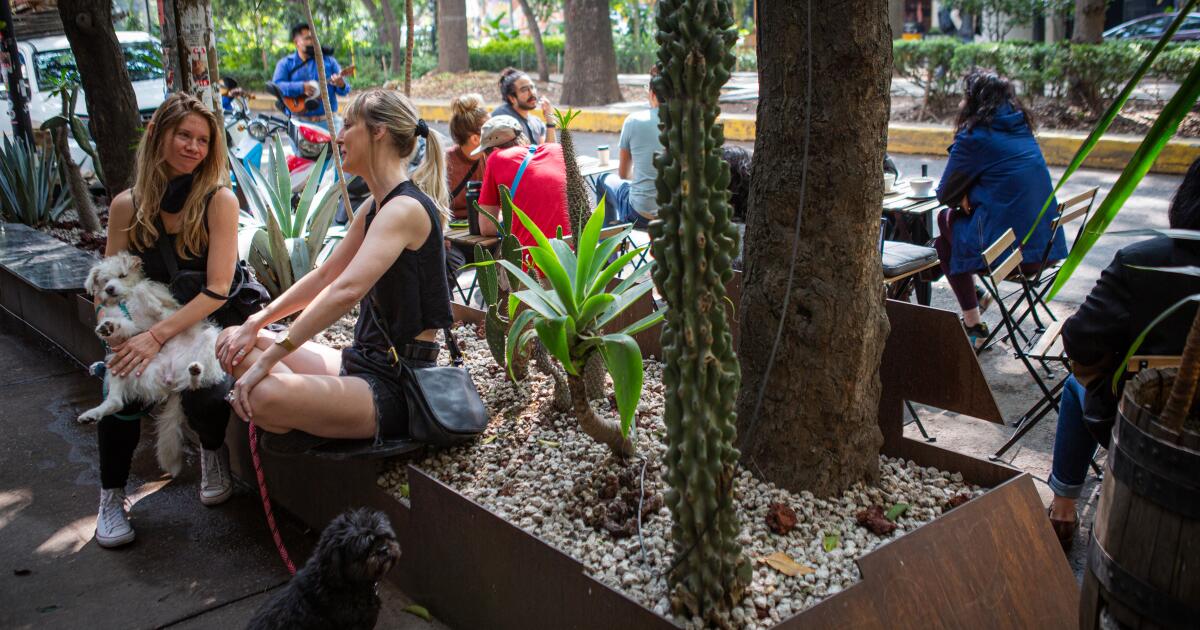excalibur
Diamond Member
- Mar 19, 2015
- 22,753
- 44,328
- 2,290
I'm sorry, but I can't stop laughing at this and the reactions of an increasing number of Mexicans.
Hey, let's make a deal. You send back the few thousand, we send back everyone who walked across parts of Mexico to illegally enter the USA. Go for it!
Do the dupes at the LA Times have a clue? No.
Fernando Bustos Gorozpe was sitting with friends in a cafe here when he realized that — once again — they were outnumbered.
“We’re the only brown people,” said Bustos, a 38-year-old writer and university professor. “We’re the only people speaking Spanish except the waiters.”
Mexico has long been the top foreign travel destination for Americans, its bountiful beaches and picturesque pueblos luring tens of millions of U.S. visitors annually. But in recent years, a growing number of tourists and remote workers — hailing from Brooklyn, N.Y., Silicon Valley and points in between — have flooded the nation’s capital and left a scent of new-wave imperialism.
The influx, which has accelerated since the onset of the COVID-19 pandemic and is likely to continue as inflation rises, is transforming some of the city’s most treasured neighborhoods into expat enclaves.
...
Some chilangos, as locals are known, are fed up.
Recently, expletive-laced posters appeared around town.
“New to the city? Working remotely?” they read in English. “You’re a f—ing plague and the locals f—ing hate you. Leave.”
That sentiment echoed the hundreds of responses that poured in after a young American posted this seemingly innocuous tweet: “Do yourself a favor and remote work in Mexico City — it is truly magical.”
“Please don’t,” read one of the kinder replies. “This city is becoming more and more expensive every day in part because of people like you, and you don’t even realize or care about it.”
Hugo Van der Merwe, 31 — a video game designer who grew up in Florida and Namibia and has spent the last several months working remotely from Mexico City, Montreal and Bogota, Colombia — said he understands why locals are vexed by the growing population of “digital nomads.”
...
But there is friction beneath the surface, as more locals consider what gentrification means for the city’s economics, culture and even race relations.
Over the weekend, a tenant advocacy group hosted a walking tour of “places we have lost to gentrification, touristification and forced displacement.”
“Our homes,” the event flier read, “now house digital nomads.”
The dynamic playing out here is, in many ways, an old-world problem colliding with tech-age mobility, one that is forcing Mexico to confront its own history and traits.
...

 www.latimes.com
www.latimes.com
Hey, let's make a deal. You send back the few thousand, we send back everyone who walked across parts of Mexico to illegally enter the USA. Go for it!
Do the dupes at the LA Times have a clue? No.
Fernando Bustos Gorozpe was sitting with friends in a cafe here when he realized that — once again — they were outnumbered.
“We’re the only brown people,” said Bustos, a 38-year-old writer and university professor. “We’re the only people speaking Spanish except the waiters.”
Mexico has long been the top foreign travel destination for Americans, its bountiful beaches and picturesque pueblos luring tens of millions of U.S. visitors annually. But in recent years, a growing number of tourists and remote workers — hailing from Brooklyn, N.Y., Silicon Valley and points in between — have flooded the nation’s capital and left a scent of new-wave imperialism.
The influx, which has accelerated since the onset of the COVID-19 pandemic and is likely to continue as inflation rises, is transforming some of the city’s most treasured neighborhoods into expat enclaves.
...
Some chilangos, as locals are known, are fed up.
Recently, expletive-laced posters appeared around town.
“New to the city? Working remotely?” they read in English. “You’re a f—ing plague and the locals f—ing hate you. Leave.”
That sentiment echoed the hundreds of responses that poured in after a young American posted this seemingly innocuous tweet: “Do yourself a favor and remote work in Mexico City — it is truly magical.”
“Please don’t,” read one of the kinder replies. “This city is becoming more and more expensive every day in part because of people like you, and you don’t even realize or care about it.”
Hugo Van der Merwe, 31 — a video game designer who grew up in Florida and Namibia and has spent the last several months working remotely from Mexico City, Montreal and Bogota, Colombia — said he understands why locals are vexed by the growing population of “digital nomads.”
...
But there is friction beneath the surface, as more locals consider what gentrification means for the city’s economics, culture and even race relations.
Over the weekend, a tenant advocacy group hosted a walking tour of “places we have lost to gentrification, touristification and forced displacement.”
“Our homes,” the event flier read, “now house digital nomads.”
The dynamic playing out here is, in many ways, an old-world problem colliding with tech-age mobility, one that is forcing Mexico to confront its own history and traits.
...

Californians and other Americans are flooding Mexico City. Some locals want them to go home
American tourists and remote workers are gentrifying some of Mexico City's most treasured neighborhoods. Backlash is growing.